Los Angeles, CA – Trademark and franchise law attorneys filed a lawsuit on behalf of the Dairy Queen® franchisor against a Culver City franchisee for allegedly breaching the franchising agreement and for trademark infringement. Dairy Queen’s trademarks have been registered with the USPTO and since the 1940’s have been franchised or licensed for use on ice cream, dairy products, and other consumables. In this case, Defendant Lee had executed two franchising agreements and licensed the rights to use Dairy Queen’s numerous trademarks. The franchising agreements require the franchisee to maintain the store at a specific standard, follow operating procedures, pay a monthly license fee, pay a lease administration fee, and pay a sales promotion program fee.
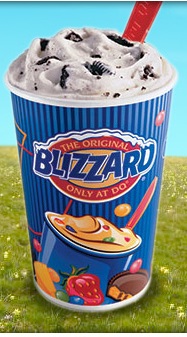 The complaint continues that the franchisee must also agree to allow Dairy Queen to audit the financial records to determine whether the proper amount of the licensing fee is being paid. If any of these franchising terms were not met and cured, it would constitute a default and the franchise rights would be terminated. After termination, the franchisee would agree to immediately cease the use and display of all of Dairy Queen’s trademarks. The terminated franchisee would also need to pay a termination fee to compensate Dairy Queen for the early termination of the franchising agreement. The complaint alleges that defendant Lee failed to comply with the upkeep standards set by Dairy Queen for its franchisee’s location and was given 60 days to correct the deficiencies, which went uncorrected. The complaint also alleges that, after an audit, it was determined that Lee underpaid Dairy Queen by $16,911.84, which Lee failed to pay after receiving notice. The complaint alleges the following causes of action: (1) Trademark infringement of USPTO registered trademarks; (2) False designation of origin under the Lanham Act 43(a) (15 U.S.C. 1125(a)); (3) Federal trademark dilution of famous trademarks under the Lanham Act 43(c) (15 U.S.C. 1125(c)); (4) Trademark counterfeiting; and (5) Breach of contract. The case is titled American Dairy Queen Corporation and DQF, Inc., v. Myung Taek Lee, CV08-01505 AHM (C.D. California).
The complaint continues that the franchisee must also agree to allow Dairy Queen to audit the financial records to determine whether the proper amount of the licensing fee is being paid. If any of these franchising terms were not met and cured, it would constitute a default and the franchise rights would be terminated. After termination, the franchisee would agree to immediately cease the use and display of all of Dairy Queen’s trademarks. The terminated franchisee would also need to pay a termination fee to compensate Dairy Queen for the early termination of the franchising agreement. The complaint alleges that defendant Lee failed to comply with the upkeep standards set by Dairy Queen for its franchisee’s location and was given 60 days to correct the deficiencies, which went uncorrected. The complaint also alleges that, after an audit, it was determined that Lee underpaid Dairy Queen by $16,911.84, which Lee failed to pay after receiving notice. The complaint alleges the following causes of action: (1) Trademark infringement of USPTO registered trademarks; (2) False designation of origin under the Lanham Act 43(a) (15 U.S.C. 1125(a)); (3) Federal trademark dilution of famous trademarks under the Lanham Act 43(c) (15 U.S.C. 1125(c)); (4) Trademark counterfeiting; and (5) Breach of contract. The case is titled American Dairy Queen Corporation and DQF, Inc., v. Myung Taek Lee, CV08-01505 AHM (C.D. California).
 Los Angeles Intellectual Property Trademark Attorney Blog
Los Angeles Intellectual Property Trademark Attorney Blog


 Plaintiff alleges that “Defendant adopted and began using the Newport Dental Group mark with actual or constructive knowledge of [Plaintiff’s] prior use and application to register the Newport Dental Marks, and with the intent to trade on the goodwill and reputation of the Newport Dental Marks. Defendant’s use of the Newport Dental Group trademark, the complaint alleges, “is likely to lead to lead consumers to erroneously believe that Defendant’s services originate from or are otherwise sponsored by, approved by, or affiliated with the owner of the Newport Dental” trademarks. In addition to preliminary and permanent injunctions, Plaintiff seeks monetary damages and attorneys’ fees as a result of the Defendant’s alleged trademark infringement. The case is titled Bright Now! Dental, Inc., v. Newport Dental Group, SACV08-00223 JVS (C.D. California).
Plaintiff alleges that “Defendant adopted and began using the Newport Dental Group mark with actual or constructive knowledge of [Plaintiff’s] prior use and application to register the Newport Dental Marks, and with the intent to trade on the goodwill and reputation of the Newport Dental Marks. Defendant’s use of the Newport Dental Group trademark, the complaint alleges, “is likely to lead to lead consumers to erroneously believe that Defendant’s services originate from or are otherwise sponsored by, approved by, or affiliated with the owner of the Newport Dental” trademarks. In addition to preliminary and permanent injunctions, Plaintiff seeks monetary damages and attorneys’ fees as a result of the Defendant’s alleged trademark infringement. The case is titled Bright Now! Dental, Inc., v. Newport Dental Group, SACV08-00223 JVS (C.D. California).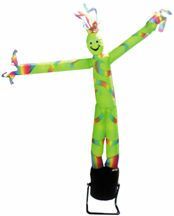 Plaintiff alleges that several defendants are infringing its patent by making, selling, and using undulating figure products embodying the patented invention. Plaintiff also states that defendants are infringing on its “Fly Guy” trademark by using the confusingly similar “Fly Guys” trademark. In addition, Plaintiff contends that the defendants are using its “Fly Guy” trademark as a Google adword to redirect consumers to defendants’ websites. The complaint asserts causes of action for infringement; federal trademark infringement of registered trademark (15 U.S.C. §§ 1114-1117; Lanham Act § 32); federal unfair competition (false designation of origin and false description (Lanham Act 43(a) and 15 U.S.C. 1125); trademark infringement under California law; California unfair competition under section 17200; and trademark dilution. Plaintiff alleges that the infringement is willful and intentional and requests that the damages be trebled. The case is titled Air Dimensional, Inc., v. Action Sky Dancers, CV08-01121 GW (C.D. California).
Plaintiff alleges that several defendants are infringing its patent by making, selling, and using undulating figure products embodying the patented invention. Plaintiff also states that defendants are infringing on its “Fly Guy” trademark by using the confusingly similar “Fly Guys” trademark. In addition, Plaintiff contends that the defendants are using its “Fly Guy” trademark as a Google adword to redirect consumers to defendants’ websites. The complaint asserts causes of action for infringement; federal trademark infringement of registered trademark (15 U.S.C. §§ 1114-1117; Lanham Act § 32); federal unfair competition (false designation of origin and false description (Lanham Act 43(a) and 15 U.S.C. 1125); trademark infringement under California law; California unfair competition under section 17200; and trademark dilution. Plaintiff alleges that the infringement is willful and intentional and requests that the damages be trebled. The case is titled Air Dimensional, Inc., v. Action Sky Dancers, CV08-01121 GW (C.D. California).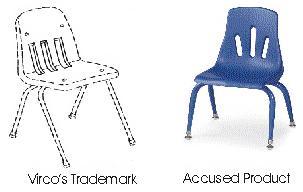 Virco alleges that in late 2007, it discovered that defendant “was manufacturing, selling, advertising, and distributing two versions of a children’s plastic chair that used [Virco three slot design trademark]. The goods sold by defendants are confusingly similar copies of the [Virco’s trademark].” Virco continues that defendant’s use of the three slot trademark “creates a likelihood that Plaintiff’s customers, potential customers, members of the trade, and the public generally will be misled as to the source of goods or services in that they are likely to believe that Defendant’s business and products are affiliated with or sponsored by Plaintiffs. The complaint sets forth the following seven causes of action: (1) Registered trademark infringement, (2) False designation of origin 15 U.S.C. 1125, (3) Trade dress infringement, (4) Common law trademark infringement, (5) Common law unfair competition, (6) Statutory unfair competition, § 17200, (7) Trademark Dilution. The case is titled Virco MFG. Corp, v. Jonti-Craft, Inc., CV08-01332 PSG (C.D. California).
Virco alleges that in late 2007, it discovered that defendant “was manufacturing, selling, advertising, and distributing two versions of a children’s plastic chair that used [Virco three slot design trademark]. The goods sold by defendants are confusingly similar copies of the [Virco’s trademark].” Virco continues that defendant’s use of the three slot trademark “creates a likelihood that Plaintiff’s customers, potential customers, members of the trade, and the public generally will be misled as to the source of goods or services in that they are likely to believe that Defendant’s business and products are affiliated with or sponsored by Plaintiffs. The complaint sets forth the following seven causes of action: (1) Registered trademark infringement, (2) False designation of origin 15 U.S.C. 1125, (3) Trade dress infringement, (4) Common law trademark infringement, (5) Common law unfair competition, (6) Statutory unfair competition, § 17200, (7) Trademark Dilution. The case is titled Virco MFG. Corp, v. Jonti-Craft, Inc., CV08-01332 PSG (C.D. California).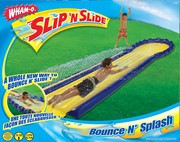 In a newly filed trademark infringement, trademark dilution, false advertising, unfair competition (17200), contributory infringement, contributory trademark dilution, and judgment debtor’s interest (Cal. Civ. Proc. Code § 708.210) lawsuit, Wham-O alleges that SLB Toys initiated an elaborate scheme designed to evade judgment and deprive Wham-O of its monetary award through an assignment for benefit of creditors. Wham-O alleges that the individual defendants, who were officers of the defendant SLB Toys, have “flagrantly disregarded the terms of this Court’s injunction by continuing to sell and distribute to retailers unauthorized slides bearing” the yellow waterslide trademark and to advertise the same. Wham-O asserts that SLB Toys was merely an undercapitalized shell corporation that failed to follow corporate formalities and the individual officers and other companies which are owned by the officers are SLB Toys’ alter egos.
In a newly filed trademark infringement, trademark dilution, false advertising, unfair competition (17200), contributory infringement, contributory trademark dilution, and judgment debtor’s interest (Cal. Civ. Proc. Code § 708.210) lawsuit, Wham-O alleges that SLB Toys initiated an elaborate scheme designed to evade judgment and deprive Wham-O of its monetary award through an assignment for benefit of creditors. Wham-O alleges that the individual defendants, who were officers of the defendant SLB Toys, have “flagrantly disregarded the terms of this Court’s injunction by continuing to sell and distribute to retailers unauthorized slides bearing” the yellow waterslide trademark and to advertise the same. Wham-O asserts that SLB Toys was merely an undercapitalized shell corporation that failed to follow corporate formalities and the individual officers and other companies which are owned by the officers are SLB Toys’ alter egos. King Tuna alleges that competing Defendants use “chemical CO” to treat their tuna during transport and not “filtered wood smoke.” Thus, plaintiff alleges that defendants’ filtered wood smoke “labeling is literally false as in actual practice and likely to mislead customers, as [defendants] misrepresent the nature, characteristics and qualities of its tuna products by presenting its raw tuna products as treated with filtered wood smoke and not chemical CO.” Plaintiff alleges that such mislabeling violates the Lanham Act because it constitutes misrepresentation in commercial advertising, which is likely to influence purchasing decisions of consumers. Also, as the complaint alleges, by mislabeling their products, defendants are engaging in unlawful business practices and unfair competition in violation of Cal. Bus. & Prof. Code § 17200.
King Tuna alleges that competing Defendants use “chemical CO” to treat their tuna during transport and not “filtered wood smoke.” Thus, plaintiff alleges that defendants’ filtered wood smoke “labeling is literally false as in actual practice and likely to mislead customers, as [defendants] misrepresent the nature, characteristics and qualities of its tuna products by presenting its raw tuna products as treated with filtered wood smoke and not chemical CO.” Plaintiff alleges that such mislabeling violates the Lanham Act because it constitutes misrepresentation in commercial advertising, which is likely to influence purchasing decisions of consumers. Also, as the complaint alleges, by mislabeling their products, defendants are engaging in unlawful business practices and unfair competition in violation of Cal. Bus. & Prof. Code § 17200.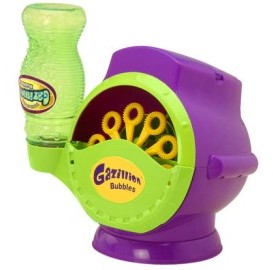 The complaint alleges that the Aahs defendants manufacture and sell bubble machines which are substantially copied from the plaintiff’s “Gazillion Bubble Machine and box packaging and Defendants Aahs’ bubble bottle and wand is substantially copied from and contains the same physical appearance and features as the trade dress of” Plaintiff’s products or is a reproduction, counterfeit, copy, or colorable imitation thereof. Plaintiff further alleges that that defendants’ infringing product “is likely to, was intended to, and did cause confusion or mistake or to deceive the relevant trade and the public into believing that the” infringing product is “sponsored by, authorized by, associated with, originates from, and/or is in some way connected with or licensed by Plaintiff.” Plaintiff continues that the infringement was willful and intentional to trade upon plaintiff’s goodwill and reputation and asks for enhanced damages and attorneys’ fees. Plaintiff also asserts causes of action for Lanham Act unfair competition Section 43(a), and unfair competition under California Business and Professions Code § 17200. The case is titled: Funrise, Inc. v. Bhasin Enterprises, Inc., CV08-01117 DSF (C.D. California February 20, 2008).
The complaint alleges that the Aahs defendants manufacture and sell bubble machines which are substantially copied from the plaintiff’s “Gazillion Bubble Machine and box packaging and Defendants Aahs’ bubble bottle and wand is substantially copied from and contains the same physical appearance and features as the trade dress of” Plaintiff’s products or is a reproduction, counterfeit, copy, or colorable imitation thereof. Plaintiff further alleges that that defendants’ infringing product “is likely to, was intended to, and did cause confusion or mistake or to deceive the relevant trade and the public into believing that the” infringing product is “sponsored by, authorized by, associated with, originates from, and/or is in some way connected with or licensed by Plaintiff.” Plaintiff continues that the infringement was willful and intentional to trade upon plaintiff’s goodwill and reputation and asks for enhanced damages and attorneys’ fees. Plaintiff also asserts causes of action for Lanham Act unfair competition Section 43(a), and unfair competition under California Business and Professions Code § 17200. The case is titled: Funrise, Inc. v. Bhasin Enterprises, Inc., CV08-01117 DSF (C.D. California February 20, 2008).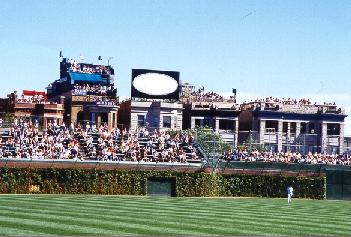 Tom Gramatis was one of the original defendants in the 2002 lawsuit and settlement agreement and he has recently built two additional buildings with rooftop seating. The Cubs allege that Gramatis breached their settlement agreement by not paying the agreed upon royalties and has not paid any royalties for the new buildings. Interestingly, the Cubs have dropped their dubious copyright infringement claim from this lawsuit – undoubtedly a lesson learned from 2002 – and only assert that Gramatis is infringing on the Cubs’ trademarks and falsely advertising an association with the team in his promotional material and website. The Cubs allege that “Defendants’ marketing efforts are, and have been, likely to cause confusion, to cause mistake or to deceive as to, inter alia, the affiliation, association or connection between Defendants and the Cubs and the Cubs’ approval or sponsorship of Defendants’ business activities.”
Tom Gramatis was one of the original defendants in the 2002 lawsuit and settlement agreement and he has recently built two additional buildings with rooftop seating. The Cubs allege that Gramatis breached their settlement agreement by not paying the agreed upon royalties and has not paid any royalties for the new buildings. Interestingly, the Cubs have dropped their dubious copyright infringement claim from this lawsuit – undoubtedly a lesson learned from 2002 – and only assert that Gramatis is infringing on the Cubs’ trademarks and falsely advertising an association with the team in his promotional material and website. The Cubs allege that “Defendants’ marketing efforts are, and have been, likely to cause confusion, to cause mistake or to deceive as to, inter alia, the affiliation, association or connection between Defendants and the Cubs and the Cubs’ approval or sponsorship of Defendants’ business activities.”  Chanel alleges that Defendants are “promoting, and or otherwise advertising, distributing, selling, and/or offering for sale counterfeit products, including at least necklaces and costume jewelry bearing trademarks which are exact copies of Chanel Marks” and are counterfeit, lower quality goods that also incorporate Chanel’s trade dress. The complaint further alleges that the “net effect of Defendants’ actions is to confuse consumers who will believe Defendants’ Counterfeit Goods are genuine goods originating from and approved by Chanel.” In addition to preliminary and permanent injunctive relief, Chanel seeks three times its actual damages under 15 U.S.C. § 1117, or, at its election, seeks statutory damages of $1,000,000.00 (one million dollars) from each defendant under 15 U.S.C. § 1117(c)(2) of the Lanham Act. The case is styled as Chanel, Inc. v. Kin Fung Poon et al., EDCV08-0224 VAP (CD CA 2008).
Chanel alleges that Defendants are “promoting, and or otherwise advertising, distributing, selling, and/or offering for sale counterfeit products, including at least necklaces and costume jewelry bearing trademarks which are exact copies of Chanel Marks” and are counterfeit, lower quality goods that also incorporate Chanel’s trade dress. The complaint further alleges that the “net effect of Defendants’ actions is to confuse consumers who will believe Defendants’ Counterfeit Goods are genuine goods originating from and approved by Chanel.” In addition to preliminary and permanent injunctive relief, Chanel seeks three times its actual damages under 15 U.S.C. § 1117, or, at its election, seeks statutory damages of $1,000,000.00 (one million dollars) from each defendant under 15 U.S.C. § 1117(c)(2) of the Lanham Act. The case is styled as Chanel, Inc. v. Kin Fung Poon et al., EDCV08-0224 VAP (CD CA 2008).